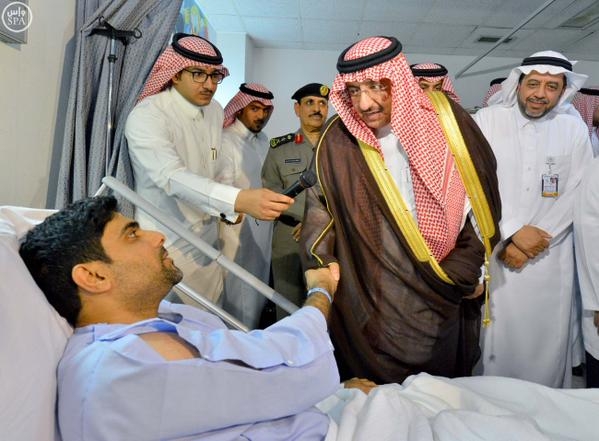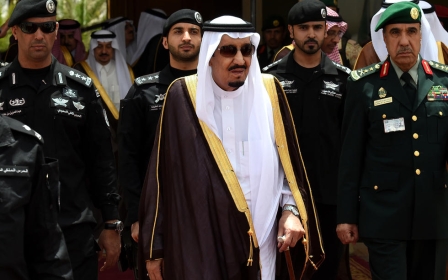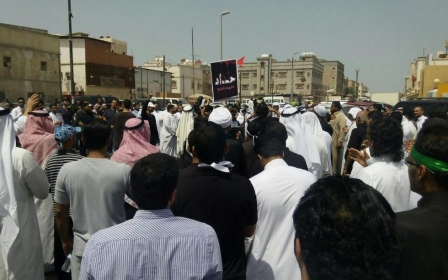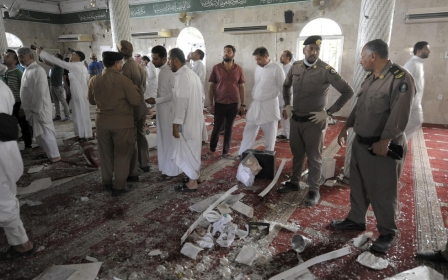Saudi Crown Prince accused of silence on sectarianism while visiting Qatif

Saudi Arabia’s Crown Prince visited on Tuesday the site of a deadly bombing in the Eastern Province, pledging to bring the perpetrators of the attack to justice.
Angry locals, however, confronted Mohammed bin Nayef bin Abdulaziz al-Saud, who is first in line to the Saudi throne, and accused him of having failed to address a rising tide of sectarianism in the kingdom.
The Crown Prince travelled to the village of Qudaih in the mainly Shiite region of Qatif after a lone suicide bomber attacked the Shiite Imam Ali mosque on 22 May killing 21 people and injuring more than 100 others.
Speaking to villagers the senior Saudi royal said the state would work to ensure such attacks do not take place again.
“The government has taken measures to ensure security in all parts of the kingdom,” he said. “Security forces will track down all perpetrators of the terror attack and bring them to justice.”
“Most of those involved in the attack have been arrested.”
Authorities have arrested 21 people in connection with the bombing, which was claimed by the Islamic State (IS) group.
The royal visit was made unannounced and locals told Middle East Eye that they only realised a high profile prince was coming when security in the village was raised on Tuesday morning.
Mohammed bin Nayef received community leaders at the King Abdullah bin Abdulaziz Celebration Hall, some 10km outside Qudaih, and also visited Qatif Central Hospital after several hours of security checks had been completed.
Residents in Qudaih, which has a population of around 30,000 people, were eager to raise issues of sectarianism with the prince, despite having been told by his security that religious and political issues were not be addressed in the visit.
Despite these warnings, the brother of one of the victims confronted the prince and accused him of being silent on the issue of sectarian divisions.
In a video that has been viewed more than 800,000 times in less than 24 hours, Mohammed Obaid said to Mohammed bin Nayef:
“If you do not do your part…listen…then you are a silent partner in this crime,” he told the prince at the hall, adding that newspapers that promote hatred of Shiite Muslims should be shut down.
The Saudi royal responded by asserting his authority and telling Obaid that the government is responsible for running the country.
“I know you are emotional and I don’t blame you…but the government is doing its part and anyone else who tries to fulfil the role [that of government] will be held accountable,” the prince said, while giving Obaid a small push in the chest.
The prince continued, partially quoting a verse from the Qur'an that says that true believers who strive in the path of God do not fear the blame of the critic.
"The state will remain a state and the security services will clamp down on those who oppose it, whoever they are. Let’s be one hand with the state," he said.
When Obaid was contacted by MEE on Wednesday, he declined to comment further and said: “There’s nothing more to say than what is said in the video.”
The Shiite community of Saudi Arabia, which is concentrated in the oil rich but poverty-stricken Eastern Province, make up around 10 to 15 percent of the country’s 28 million population.
They have long complained about perceived government discrimination in employment, education, and housing – charges the country’s rulers have repeatedly denied.
In the aftermath of the attack on Qudaih, villagers gathered for a huge funeral on Monday and carried slogans that called for an end to sectarianism.
Locals told MEE that hatred of Shiite Muslims has been allowed to spread through religious preachers, the education system, and in the media, all of which the government is alleged to have ignored.
“We demand an end to hatred and Takfirism (accusations of apostasy) against Shiites,” said Sayed Mohammed, a Qudaih resident and community activist. “The Takfirism did not begin with the person that committed the attack on Friday.”
“The real problem is the preachers who say the Shiites are not Muslims, the curriculum that teaches children from the first year of primary school that Shiites are not Muslims – these opinions are also being spread by media outlets.”
During his brief visit to Qatif, Crown Prince Mohammed bin Nayef asked residents to write their concerns about sectarianism on a piece of paper and give it to him.
The video of the prince being confronted in Qatif has prompted much discussion online, with more than 1,000 comments posted on YouTube by Wednesday morning.
Some users supported the prince as having shown his authority, others criticised him as having avoided answering the question about sectarianism, and some revealed the community divisions in Saudi Arabia by commenting that Mohammed bin Nayef had “set the Shiites straight” on who is in charge.
New MEE newsletter: Jerusalem Dispatch
Sign up to get the latest insights and analysis on Israel-Palestine, alongside Turkey Unpacked and other MEE newsletters
Middle East Eye delivers independent and unrivalled coverage and analysis of the Middle East, North Africa and beyond. To learn more about republishing this content and the associated fees, please fill out this form. More about MEE can be found here.




